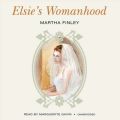
|
Christian womanhood. What does it mean? When does it happen–at a certain age, status, or maturity? How do we know we're no longer girls? And when we've figured that out, how will others know to call us «woman» rather than «girl»? Christian women don't usually get a rite of passage in which they are named «woman.» Seeing this need, Amy Davis Abdallah created such a rite, and this book accompanies it. No need to be in her rite of passage, however, to name yourself «woman.» Read this book and then sit down with some friends to talk about it over tea, coffee, and/or chocolate. Let The Book of Womanhood create a path through the confusion by its flexible framework of finding identity through developing relationship with God, self, others, and creation. Amy writes simply as one perhaps further along in her journey of womanhood, and she doesn't write alone. She includes the stories of biblical women, of friends young and old, and even more. The diverse voices come together as a cloud of witnesses–encouraging us in our individual journeys. Read for empowerment. Read for transformation. Read. And become the woman of God you were created to be. |


